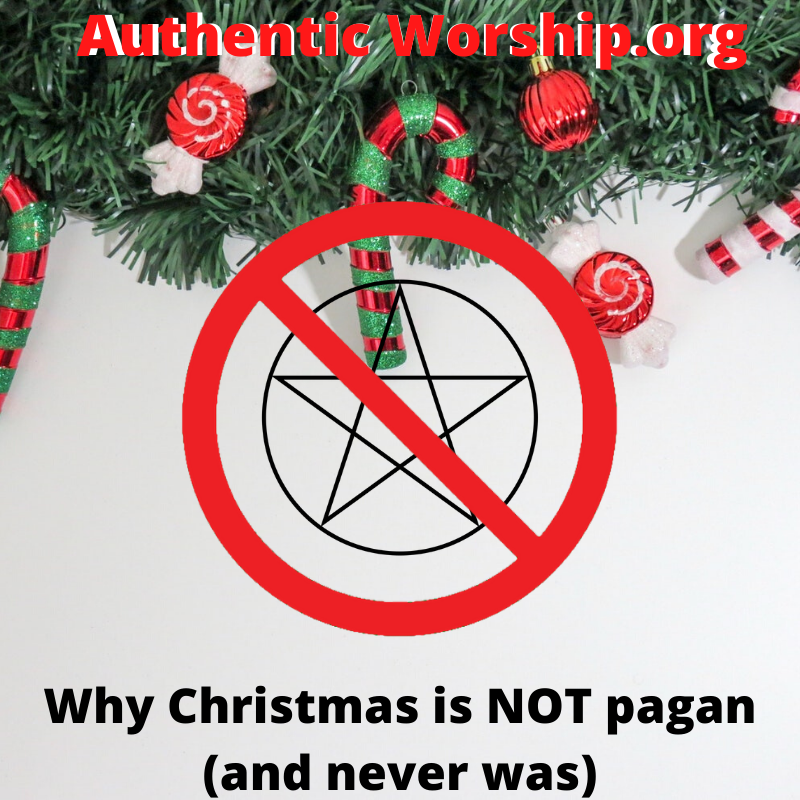Why Christmas is NOT pagan
Every year, about the same time retail store start pumping holiday tunes through the speakers, a curious phenomenon begins. A steady drip of articles appear, declaring the pagan roots of Christmas. In 2018 there was this CBS article. The year before, Forbes financial magazine felt the need to weigh in on the issue. Seemingly everyone wants to take a stab at the establishment and cut the tree off at the trunk. (You see what I did there?)
Now, whether or not a specific cultural tradition, like the Christmas tree, has its roots in a non-christian tradition, (And yes, there’s a decent chance it does) is a complicated and perhaps impossible-to-answer question. But let’s get one thing crystal clear. Christmas itself, is not pagan.
The First Christmas Celebration
It is true that there is no evidence that the early church celebrated Jesus birth. Observance of the resurrection was far more important to early Christians than was the nativity. If Jesus came in the flesh, he must have been born. Commemorating the when and where was not necessarily a priority. To the early church, Jesus’ birth was simply a necesary means to an end, the salvation of mankind.
But around 330 AD, the church decided that Jesus needed a birthday. Or, at the very least, that the church should begin celebrating the one that He had, whenever it was. Therefore a feast date was chosen, and that date happened to be December 25th.
“But, I thought Christmas was Catholic!”
Some protestants today refuse to celebrate the feast because it was begun by the Roman Catholic Church. This is a lousy excuse. The Catholic Church in 330 was not the same Roman Catholic Church we know today. Among other things, they did not pray to Mary or the saints. They did not believe in the doctrine of purgatory. And they did not view papal decrees as infallible. The Catholic Church at the time of the first Christmas feast, was largely orthodox and biblical.
Why the 25th?
But how did the church decide on December 25th? While most secularists, and some Christians want you to believe the date was chosen to shrewdly play off of pagan holidays, there is zero evidence for this. None. (No, facebook, and the History Channel don’t count!) Much has also been made of the supposed ties to the pagan celebrations of Saturnalia and Sol Invictus. But this is purely speculation. (Truly, if you believe otherwise, let’s see some sources.) Other Roman festivals in December included:
1. Festival of Neptune.
2. Festival of Bona Dea
3. Festival of Faunus
4. Festival of Tiberinius
5. Agonalia
6. Festival of Consus.
7. Festival of Tellus.
9. 2nd festival to Consus.
10. Saturnalia.
11. Festival of Epona
12. Festival to Ops.
13. Festival of Angeronae
14. Festival of the Lares.
15. Larentalia
16. Midwinter solstice
In such a polytheistic culture, there was surely no way to avoid all pagan holy days or months. The idea that the church added a Christian feast just to make it palatable and attractive to non-christians is ignorant of history.
A nine month pregnancy
One possible reason the 25th was chosen was because of an early tradition that held that Mary become pregnant on March 25th. By the fourth century, this apocryphal belief was widely held. After a normal, nine month pregnancy, Jesus would have been born on December 25th. There’s no knowing how serious this belief was taken. So, as to the real reason the church in Rome chose December 25th, we honestly don’t know. Anyone who claims otherwise, has had too much eggnog.
Download our full Christmas album for free. Right now!
Should We Celebrate Christmas?
But should Christians celebrate Christmas? Clearly there is no command in scripture to commemorate Jesus’ birth. (Unlike the command to commemorate his death through the bread and cup). It would be a mistake however to dismiss godly celebration simply because it is not commanded or found in the New Testament. Instrumental music is not portrayed in worship in the New Testament. Should all Christians join the Church of Christ denomination and forbid instruments in worship? Similarly, though the post-biblical early church did observe Easter, the resurrection celebration is not found in the New Testament. Should the church forgo this holiday as well?
The Law of Liberty
Christmas, Easter, and other Christian, non scriptural holidays are probably best celebrated under the “law of liberty.” Paul addresses such issues of conscience in his letter to the Romans.
“As for the one who is weak in faith, welcome him, but not to quarrel over opinions. One person believes he may eat anything, while the weak person eats only vegetables. Let not the one who eats despise the one who abstains, and let not the one who abstains pass judgment on the one who eats, for God has welcomed him. Who are you to pass judgment on the servant of another?” (Romans 14:1-4 esv)
And so, those who would celebrate the coming of the Savior, should do so with joy in their hearts, regardless of the season. At the same time they should act in love toward those who abstain, being thankful that their abstention comes from a desire to faithfully celebrate Christ.
If you enjoyed this article, please subscribe!


Excellent article! Thanks for sharing!